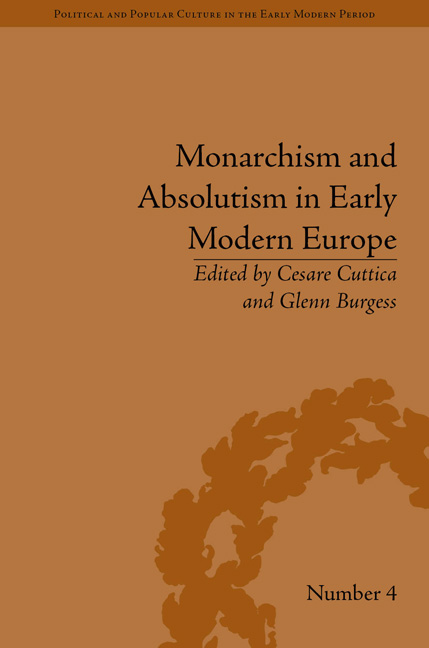Book contents
- Frontmatter
- CONTENTS
- Acknowledgements
- List of Contributors
- Introduction: Monarchism and Absolutism in Early Modern Europe
- Part I Royalists, Republicans, Patriarchalists: English Thinkers at Odds in the Seventeenth Century
- Part II Absolutism, Cynicism, Patriotism: Eighteenth-Century Enlightenment Reflections
- 4 Cynic Kingship in the German Enlightenment
- 5 Polizey and Patriotism: Joseph Von Sonnenfels and the Legitimacy of Enlightened Monarchy in the Gaze of Eighteenth-Century State Sciences
- 6 Absolutism, Patriotism and Publicity in Denmark-Norway in the Eighteenth Century: Jens Schielderup Sneedorff, Andreas Schytte and Frederik Sneedorff
- 7 Jansenist Jurisdictionalism and Enlightenment: Two Ways of Thinking Politics in Mid-Eighteenth-Century Naples
- Part III Absolutism, Monarchism, Despotism in Theory and Practice: Contested Historiography and Comparative Approach
- Part IV Monarchy, the State of Nature, Religion and Iconography in European Perspective
- Notes
- Works Cited
- Index
4 - Cynic Kingship in the German Enlightenment
from Part II - Absolutism, Cynicism, Patriotism: Eighteenth-Century Enlightenment Reflections
- Frontmatter
- CONTENTS
- Acknowledgements
- List of Contributors
- Introduction: Monarchism and Absolutism in Early Modern Europe
- Part I Royalists, Republicans, Patriarchalists: English Thinkers at Odds in the Seventeenth Century
- Part II Absolutism, Cynicism, Patriotism: Eighteenth-Century Enlightenment Reflections
- 4 Cynic Kingship in the German Enlightenment
- 5 Polizey and Patriotism: Joseph Von Sonnenfels and the Legitimacy of Enlightened Monarchy in the Gaze of Eighteenth-Century State Sciences
- 6 Absolutism, Patriotism and Publicity in Denmark-Norway in the Eighteenth Century: Jens Schielderup Sneedorff, Andreas Schytte and Frederik Sneedorff
- 7 Jansenist Jurisdictionalism and Enlightenment: Two Ways of Thinking Politics in Mid-Eighteenth-Century Naples
- Part III Absolutism, Monarchism, Despotism in Theory and Practice: Contested Historiography and Comparative Approach
- Part IV Monarchy, the State of Nature, Religion and Iconography in European Perspective
- Notes
- Works Cited
- Index
Summary
To readers with a modicum of knowledge about the ancient cynics, the concept of ‘cynic kingship’ may come as a surprise. After all, the most famous cynic, Diogenes of Sinope, lived in a barrel and avoided all civic duties, calling himself a citizen of the cosmos, not of the city. When a real king, Alexander the Great, came calling, Diogenes told him to get out of his sunlight, making the point that he did not need anything from a king. This would not seem likely material from which to construct a theory of monarchy or kingship. Nevertheless, ideas about cynic kingship were constructed, both in the ancient world and in the early modern world. The cynic view of kingship could include real kings who were educated by cynics into being noble and just; and cynics who were actually kings in one metaphorical way or another, although not in the traditional sense. This chapter will explore some of the uses of ideas about cynic kingship in German-speaking Europe in the Age of Enlightenment. But it will have to start with the ancient sources.
A general introduction to ancient cynicism would mention that the name ‘cynic’ came from the Greek word for ‘dog’, and implied that they lived like dogs. Critics might have meant that as an insult, but the cynics took on the name with pride.
- Type
- Chapter
- Information
- Monarchism and Absolutism in Early Modern Europe , pp. 61 - 74Publisher: Pickering & ChattoFirst published in: 2014



